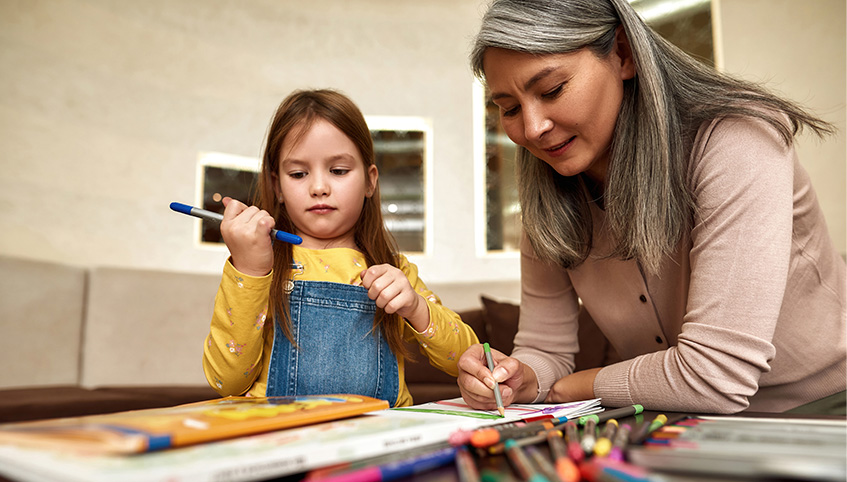January 02, 2025
When a parent is diagnosed with cancer or a chronic illness, there are many things they must consider. Some are expected – what’s the best course of treatment, where will they get care and such. But others are unique to their role as a parent – when and how do they share the news with their kids? How much information should they share? And what resources will their kids need during this period?
Turning Point is a free center offering research-backed programs not only for those with serious or chronic health conditions but also for their children. Turning Point has group programs in person or via Zoom as well as individualized consultations.
For example, after Amy Ansley was diagnosed with breast cancer, she worried about whether she was explaining her illness in the best way. She reached out to Turning Point and scheduled a phone consultation.
“Parents can call and ask questions,” says Annie Seal, children’s program director and certified child life specialist at Turning Point. “I know Amy was questioning, initially, ‘Did I do it wrong?’ And the answer is, ‘No, you didn't do it wrong.’ We were able to discuss the various ways to talk to her kids about her diagnosis. What she wanted to do based on her kids' ages, and what information she felt like she wanted to share.”
What Amy was told is applicable to other parents going through a serious or chronic illness as well. When you are determining what to tell your kids, Seal and medical oncologist Anne O’Dea, MD, have some tips.
Stick to the facts and the present moment
You do not need to share every detail. Consider what your current situation is, what you know to be true now and what you’re comfortable sharing.
“As adults, we're often so forward-thinking. However, kids are very present-oriented,” says Seal. “I use the analogy of chapters in a book. We kind of start with the beginning of that chapter.”
You don’t need to tell them what the ending is going to be or where things may get tough. Just communicate what’s happening now.
Analogies are a helpful tool
Similarly, using an analogy to describe your illness or your treatment journey can be helpful to a child. To continue the book analogy, you might tell them that this is a story you’re just starting. You will read and experience it together and learn more as you go along.
Let them know you’re open and available
“So often kids come to us not necessarily looking for answers, but they're looking to see if we’re OK with having a hard conversation,” says Seal.
She recommends allowing kids to ask any question that they have and letting them know that no question is off-limits. Answer using factual, honest and gentle language.
“Any difficult conversation that we need to have with our kids, whether it be surrounding illness, death or drugs, we want them to know that we are available and we're open to talk about those hard topics,” says Seal.

Don’t hide your emotions
“Parents often say to me, ‘I just am so afraid I'm going to become emotional in this conversation,’” says Dr. O’Dea. “If you become emotional, that's OK. Just say, ‘I get scared about this,’ or ‘I'm worried about this.’ Our kids have to see that just because a conversation is difficult doesn't mean that we don't have it.”
Dr. O’Dea says this modeling is important for kids to see because it applies to so many topics, not just cancer but challenges at school or future difficulties in their life.
“We want our kids to know that they can come to us and talk about anything,” she says. “No matter if they're 2 and having trouble, or whether they're 20 and having trouble, we are there and we're available.”
Reach out to experts
“Don't be afraid to ask for help,” says Dr. O’Dea. “It's OK to talk to other people.”
Those experts could be your care providers, the team at Turning Point, other patients, family members or resources like videos and handouts. A great place to start is by finding a program at Turning Point that fits your child’s situation.
Say something
“Don't be so afraid of saying the wrong thing that you say nothing,” says Seal.
Stoicism, or denial, is not helpful for the kids in the long-term.
“I think as moms, our instinct is to fix everything for our children, and put on this happy face,” says Dr. O’Dea. “If we ever think about cancer as an opportunity, it could be to model for our children how we would approach a significant health challenge in our life. Those types of lessons are the ones that children will carry into their life in the future.”
Ignoring your challenges and saying nothing robs them of the opportunity to learn those lessons.
